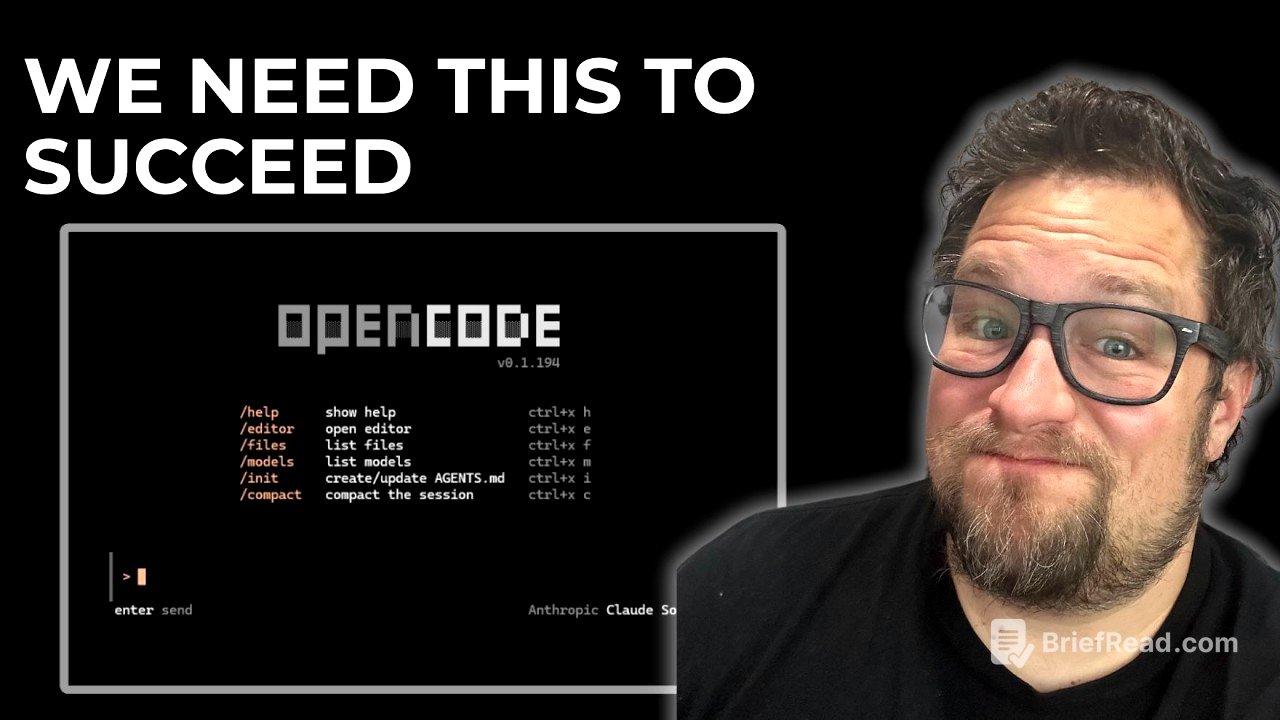TLDR;
The video explores using Open Code with local models to recreate the Flappy Bird game, highlighting the importance of open-source coding solutions and discussing the current landscape of AI coding tools. It covers tips and tricks for using Open Code, compares it with other platforms like Cloud Code and Cursor, and addresses the rising costs and potential pitfalls of relying solely on cloud-based AI coding services. The video emphasizes the need for transparent usage policies and supports open-source projects as a sustainable alternative.
- Open Code is a cloud code competitor that allows the use of local models.
- SST Open Code GitHub repository is recommended.
- Cloud Code is currently pro-consumer, while Cursor's new pricing is anti-consumer.
- Open-source projects are crucial for the future of coding.
Introduction to Open Code and Local Models [0:00]
The author introduces Open Code and its application with local models, specifically using Devstral Small to attempt recreating the Flappy Bird game. The demonstration aims to showcase Open Code's capabilities and the potential of local models in coding. The author expresses a preference for open-source solutions and highlights the importance of having alternatives to cloud-based coding platforms.
Open Code Configuration and Prompting [0:32]
The author explains how to configure Open Code to use the Devstral Small model. He uses a prompt generated by OpenAI to instruct the model to create a Flappy Bird clone. The process demonstrates the speed and efficiency of Open Code with local models, monitoring GPU usage during the code generation.
Open Code as a Cloud Code Competitor [1:47]
Open Code is positioned as a competitor to Cloud Code, emphasizing the importance of open-source solutions for coding. The author shares his positive experiences using Open Code with various models like Claude 4, Gemini 2.5 Pro, and Devstril, noting its effectiveness for different coding tasks. The initial attempt to generate the Flappy Bird clone requires further prompting to create the actual file.
Tips and Tricks for Using Open Code [2:37]
The author shares several tips and tricks for effectively using Open Code. One key point is how to add files to the context, noting that Open Code requires typing part of the file name after a phrase like "use the following" to trigger autocomplete, unlike the "@" symbol used in Cloud Code. He also recommends using the SST Open Code GitHub repository and cautions against using Gemini 2.5 Pro due to potential infinite loops. Additionally, he clarifies the correct method for authenticating providers using the Open Code O login command and emphasizes the importance of the opencode.json configuration file. He also points out that the "clear" command does not exist in Open Code, and users should use "new session" instead.
Flappy Bird Clone Demonstration [6:31]
The author showcases the Flappy Bird clone generated by Devstral Small using Open Code. Despite some initial difficulty in navigating the game due to physics, the result is surprisingly good, especially considering it was created with a local model. The demonstration highlights Open Code's ability to follow tool calls and produce error-free output.
The Need for Open Source Solutions and Local Models [7:28]
The author discusses the necessity of open-source solutions and local models in coding, driven by concerns about the profitability and sustainability of cloud-based AI coding services. He points out that many AI companies are not profitable and that the era of free AI is ending, leading to potentially high costs for coding in the future. He contrasts pro-consumer platforms like Cloud Code with anti-consumer practices, such as Cursor's changes to pricing and features.
Pricing Concerns and Cursor's Controversial Changes [8:39]
The author expresses concerns about the lack of transparency in usage policies for platforms like Cloud Code and criticizes Cursor for significantly altering its pricing model after users had already paid for a year of service. He details Cursor's new pricing terms, which include unlimited usage in "auto mode" with randomly selected models and limited requests for specific models under a monthly credit system. The author views these changes as unfavorable and not aligned with what he originally paid for.
Call to Support Open Source Projects [12:08]
The author urges viewers to support open-source projects like Open Code, Root Code, and Klein, emphasizing the importance of their success in providing sustainable and transparent coding solutions. He reiterates the need for these projects to effectively utilize local models, offering a viable alternative to the potentially unstable and costly cloud-based services.









